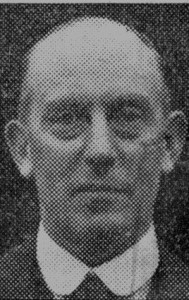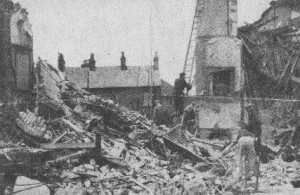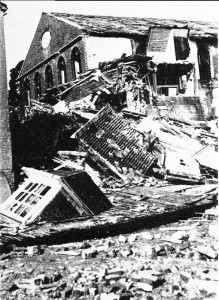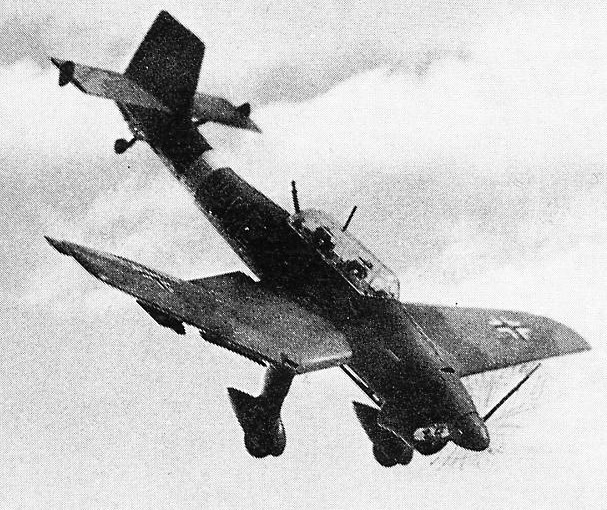Swastika Over Rye
As remembered by Arthur Woodgate
War is Declared
When our then Prime Minister Neville Chamberlain, declared War on Germany on Sunday morning 3 September 1939, the air raid sirens started up immediately, so stupidly I suppose, I looked out of the front door to see if I could hear any aeroplane engines or see any planes. I couldn’t but low and behold, flying over the Tillingham Bridge was the Swastika flag, the symbol of Nazi Germany.
There were several freighters in The Strand at that time and being Sunday they were “dressed overall (think that is the proper term) and so the German flag would be flying from the bowsprit of her, as would the National flag of the other freighters in The Strand that morning. I don’t remember her name, being German couldn’t say it right anyway, but she was a frequent visitor to Rye, and we sort of regarded her as part of the town. She had brought a cargo of timber from The Baltic which it had just been unloaded into Thomas Hinds And Sons Timber Yard on The Strand and had things been normal, she would have gone round to Brede Sluice to load up with old iron from Gassons lump next morning, to take back to Germany, but it wasn’t to be this time. That was one load the Germans couldn’t throw back at us full of high explosives!
A Friend Who Became an Enemy
So what was to become of a friend who suddenly became an enemy? The General opinion was; and (I believe it) that the Harbour Master gave the skipper the option to let him intern him ship for the duration, or he would shut his eyes if he made a run for it to get home, there was no sign of our tuton friends next morning so we reckoned he made a run for it, and we didn’t hear any more of her. Since those Continental ships that called in Rye had their family with them and their ship was their home! I think the skipper was wrong as I doubt they got back to Germany.
With this fact, I got to thinking that civilian residents 1939 and 1945, that is if there can be regarded that there were any civilians in TOTAL WAR. I say this when, as a four year old in the infant school in 1917, in Lion Street, we had pull pieces of rag into strips to fill cushions for the soldiers in the trenches in France, and we could now and then hear bombs dropping from Zeppelins regardless upon who they fell. Throughout the 1940s thousands of so called civilians were killed in cities, towns and even villages across the World.
Where did the Mayor go?

It was not many months into the Second World War when the then Mayor of Rye, Councillor George Marsden, just disappeared. There could be one of two reasons for this, one; that he just let us down and ran away, or two; he was a reserve member of our security organisation and had to report quietly to one of our spy groups. I hope the latter was the case, but what ever, it left our deputy mayor in charge and in the front line. This put the well liked Joe Cooper in great danger as there was no doubt Rye could have been one of the first towns to be taken over by any invading Germans and the leader of the town would be high on the list for the Gestapo to deal with.
Would there be Germans on the Next Train?
So here we stood, both in uniform and out as the lads came back from Dunkirk, and thinking the next train would be loaded with Germans ready to take over our administration and our lives, and as we stood there if anybody was not shaking then they were not human. As I thought of my own job, I wondered if I would be shot; as a local Trade Union Leader; or sent to a concentration camp. But I wondered and felt for our chief citizen Joe Cooper. What could he do for the safety of his subjects? Not much! and what could we do to help him? Not much! but I did decide I would call a meeting for all local active Trade Unionists, in order to form a rota of those willing to step in as each leader was removed. This didn’t seem a good idea as we began to be directed by our own Government into all sorts of things in all sorts of places. There must be many thousands who have experienced this, but I can’t work out how to explain the emotional experience when one had been expecting to be killed, but then found they were still here. I was very glad the town did recognise Joe Cooper after the War; even though the worse didn’t happen; and name a road after him.
The events I’m remembering now are not in any form of order because the 1940s were very hectic. The memories are very real, but could only have been kept in order if one had plenty of spare time, this was not possible.
Horses Died of Fright
Now I remember being sent to a farm which had been burned out by incediarary bombs, in a night raid. All the buildings except the farm house were destroyed. Although the two horses had been led out of the stable by a brave farmer, whilst the building was covered in flames, and taken to a field away a bit from the farm, they died of heart attacks next day. Horses are frightened terribly by fire we got the farm back in enough order so it continued to produce some food to help the nation at this time of severe rationing.
When it was established that the South East of England was the front line there was a big evacuation. I heard of one old lady who refused to move, and said, “No German is going to drive me out of my home”. It so happened I was around and sharing duties with the R.A.M.C. in their advanced dressing station in Watchbell Street. When the (all clear) went, leaving me time to maybe grab an hours sleep before going to put someone’s roof back or preparing a site for more incoming troops, I passed the old ladies house, outside of which she was always standing a shouting to anybody and everybody “I’M STILL HERE”. Her name was Mrs Kirby and she lived at the bottom of Mermaid Street. If she has any descendants around, and I’m sure she has, let me say “You had a very brave and defiant British Ancestor, who never was driven from her home”.
Incendiary Pears!
It may be that I have written this before but it fits in here and adds a bit of humour to this very frightening era. It was in the A.D.S when the Corporal and I were on awake duty, (we used take turns of a snooze on a stretcher) when we heard what we thought could have been a bomb dropping spilling incendiaries, but it wasn’t it was pears falling off a tree, so off gas masks and pick up a few pears to take back in for the duty crew to eat. It was a good job because we had in our care a group of old time soldiers who had been guarding the Radar Station at Brookland when it was bombed. They were not very badly injured but they were suffering from very bad shock. They would not let go of their tin hats and even had them in bed with them and when a German pilot was brought to us in a rather bad state he had to be moved again or they would have pulled him to pieces, and when he was taken to Rye Hospital; they had similar trouble from the relatives of that days bombing raids victims.
Bombs Straddled Rye

When one string of bombs straddled Rye, (and there were many such strings) it destroyed property in The Mint, the blast lifted a wireless pole from one garden and planted in the next the other way up but just as upright!
The fairly new army camp at Lydd had been flattened and in the course of my duties I travelled to the old camp. I saw there the result of two more blasts strikes. One single bungalow had been reduced into a lump of rubble but the roof had fallen intact on to this lump and not a tile had been displaced. Almost next door blast had destroyed one of a pair of bungalows without the other being damaged except a wall had been blow out, so the other one could have been rebuilt into it, but I don’t expect they did that.
Three Colleagues Killed
Blast did such funny things that is why we had to think more about that than direct hits when building street air raid shelters, I don’t mean that blast was the only danger to civilians, of course it wasn’t but mixed with action it was not insignificant. Three of my colleagues on Romney Marsh were trying to make life a bit better for a family who had had their roof blown off by a bomb, had one man up the roof and one at the top of a ladder at the eaves and the third on the ground. There was a shelter in the garden into which the man on the ground ran, but he was killed by a direct hit, whilst the two on the roof were blown, ladders and all, over the ridge of the roof and killed when they hit the ground on the other side. There was no safety.
Dr. Button was a Hero
On the way to look in on another job that day a hedge hopper came at me but missed my head by at least two inches. These fighter planes came in under the radar and opened up with their machine guns at anybody. My two year old cousin was being pushed along Rye High Street in a push chair by her Mother when they were attacked by one of these and both were taken to Rye Hospital my Aunt was not too bad but my Cousin had a bullet in her kidney which was successfully removed by our wonderful G.P “Surgeon” as we called him Dr Button; My cousin lived to bring up a family.
The wall along Cinque Ports Street in front of the now car park was, when it was in front of a garden; some ten feet high and when a bomb came across the town and hit it, it drilled a three feet or so perfect hole in it, on its way to explode in the Regent Cinema. The parents of one of our recent mayors, Paul Carey, were looking at the stills on the front of the cinema when it fell, but were not seriously hurt even though buried in rubble, but the manager was killed in his office. A matinee which would have taken place that day was cancelled because the children had by then been evacuated to Bedford.
British Determination
The British Determination was shown again by our fishermen. I’m not going to labour the point as to how the Council treated the bodies of those gunned down in Rye bay whilst trying to bring in some food for the nation and the whole world knows how they took part in the small boat rescues, but one cannot pass this way in an article without paying more tribute to those heroes.

I think I have mentioned this before when I wrote about The Strand. But I thought it was funny and one needed to find something to laugh about during the 1940’s. It was a very dark night, but for some reason the planes with the Swastika on stopped coming early that night so we slacked off at the A.D.S. and I went home, on the way I heard shouts for help coming from the river, I answered his call so he stopped so I had to ask him to carry on making noise, which he did and when I found him he was on the deck of a small boat down in the mud. He was one of the young soldiers drafted into the area and been spending some time in The Ship Inn on The Strand. He knew which way he had to go but thought the coping on the new piles which were part of the Quay, was a pavement and started walking on it with confidence. But it is narrower than a street pavement and he walked to the river side and fell in. It was a good job that a boat was there, otherwise he would have gone into our infamous mud and never been seen again, and his commanding officer would have had a problem telling his family. However, with my help he got back on the quay. Then his problem was how to explain why he would be reporting in late, so I went back to the Rye Drill Hall and explained to the officer there, so no action was taken.
“Old Faithful”
Rye had a light railway train that pulled and pushed passengers from Ashford to Hastings all day, stopping at all the Halts we called it “Old Faithful” because it had never, not been there when expected, one day a hedge hopper came head on with our little train, and smashed the front of its engine, but no one on the footplate was seriously injured, but you can bet they were both badly shocked in spite of that, she continued to chug along until they got somewhere where they could hitch on a fresh engine. More British determination.
The Swastika covered Nazi planes came in over Eastbourne, after “Lord Ha.Ha” (William Joyce, The English Spy who was working for the Germans) had been telling us over the radio that they would be destroying the beautiful flower gardens along Eastbourne sea front; and they did! But it didn’t stop there, as London was mainly their target, so they left a mess up through Sussex. Whilst I was trying to help put some of that damage right, I had a message came that my home with my Father and sister were in, and giving me permission to go and help because it had been badly bombed. The petrol rationing had got very tight so I had to get back on public transport, so I got a train, but when I got to Brighton I was told I couldn’t get further than Hastings because Rye had been blown to pieces. However, they put a bus on at Hastings and that unloaded us at Rye Station so as I walked up the road I could see that poor little Rye and all those in it had had a terrible pasting from the German bombers.
“The Old Man’s Alright”
Before I had walked very far in the rubble, someone who evidently knew me, shouted at me “The old man’s alright, I’ve just seen him going up the road”. It soon became obvious why the rail services were upset, as a whole length of rail line had been blown from it’s moorings and planted against the wall of the corn store (now the Ferry Road night club) the crossing gates were in a right mess and so was the whole of the crossing area. Godfrey’s row in Wish Street was completely destroyed, as was Havelock villas and some offices on The Strand. Several people had been killed in Godfrey’s row. Here again real British bravery and defiance came into operation as one school boy heard a bomb coming, he arched himself across a young sister whose life he saved. Fortunately the boy was not badly hurt although he was covered in dust and rubble George Bumpstead and his dad were both killed.
Bank Clerk Killed
In Havelock Villas, one man, Mr Castle, a bank clerk was killed, the rest of the inhabitants had either gone to work or were out shopping and I hope making use of the street shelters. When I reached my home I found most of the damage was to windows and doors. Many of the doors had been cut in half horizontally like stable doors. Father had a narrow escape in that he was in his workshop in Wish Street and his roof blew off, and a piece of Rock came down right beside him as he chiselled away at the stone as was his trade. My sister was at work at the Hygienic Laundry which was not touched. Whilst I was trying to mend some of the doors and windows, enough for a fairly comfortable night; (Swastikas permitting), we were told there was an unexploded bomb on The Strand and we must move out, so whilst I was then arranging for a move out, we were told we could stay because it was a false alarm. It was an iron office safe they had found, so we stayed the night.
Booby Trap
Romney Marsh could have been a bridgehead for invading troops from the North of France or for our troops to be a jumping off point for our (civilian mainly) Army to invade France, and all sorts of conscript regiments were moving in. I was sent to St Mary’s in the Marsh Village to prepare for the Somerset Light Infantry.
I never knew what had happened to the villagers, as none seemed to be around. The young Somerset men were lovely speaking with West Country dialects, and it was pleasing to be with them and listen to their accent. I got to know some of them quite well. They had no desire to be there and I bet their officers found it difficult to make them hurt anybody, as my mate, Fred Edwards, drew up with a lorry load of building material beside an empty house which I felt suitable for a store, one of these lads gave me a mighty shove and knocked me down just as I was about to open the front door. He sent me yards away from the house. When I got up he explained that he had just saved my life “If you had touched that door knob, the whole house, you and all, would have blown up. It is a booby trap, so don’t touch anything around here without consulting one of us. Needless to say that’s what we did and we became good friends, even with the officers. They were only just sitting there waiting for anything to happen and hoping it wouldn’t. They were mostly farm workers back home and were helping the local farmers pull their root crops. One afternoon a Swastika marked messerschmitt plane got into some sort of trouble and landed in a nearby field, two of the lads were pulling swedes, and one looked at the other and said “better go and bring him in, I suppose”, so off they went with no hats, no jackets and no guns, as he panicked with both hands in the air. One could feel sorry for the poor little German, but he needn’t have worried. They left him somewhere secure and went back to pulling turnips, and Fred and I went back to poor old damaged Rye.
Crashed Fighter
The bravery of our pilots in the Battle of Britain was remarkable. I saw a Spitfire with his throttle fully open, corkscrew down and disappear into a green field, just as if it was water, near Camber Castle. (I remember seeing in the newspaper, some seventy years after, that his remains had been found). I put some thought into what was happening to those living and working below the Battle in the skies. I hope I have given some idea. But if anybody knows any more stories of those times, may be they will add them in due course.
The Marsh Saved the City More Destruction
Its all very well Airmen but I felt what was going on among the ordinary people should be told. I realise that what I have just written is very small compared with the damage to our big cities but if one looked at all the holes in the fields of Romney Marsh and the general damage to the South East of England one would realise what had been saved to those cities by what had happened here.
It’s all very well and quite right to expose the Nazi horrors carried out under the badge of the Swastika but, if they think about it, all good thinking people of the World must wonder what the ordinary people of Iraq must have thought of the planes with stars and stripes on them when they killed many of them and smashed their homes. No more than we did of the Swastika.
Regent Rebuilt
Just to show how poor little Rye suffered. When hostilities were over it was allowed, by special Government permission, to rebuild it’s major building of entertainment the Regent Cinema; but as there had been so many homes and economic buildings damaged or destroyed, no local labour could be used on rebuilding it and the contract was given to a firm from Uxbridge, a lot nearer to London, so one must conclude that the South East suffered pretty badly.
Why can’t the ‘Star of David’, Islamic Crescent and the ‘Christian Cross’ be Joined together with all other Religious Emblems in the name of Peace?
Writing this has brought tears to my eyes to think that World politicians are still so unsympathetic to the people they are supposed to protect that wars continue. It is not only politicians because the leaders of the World religious groups are no better.
When I was a school boy being brought up as non-conformist and had to attend a Methodist Sunday School I was encouraged to speak against Anglicans and to almost hate Roman Catholics. Fortunately this has all altered and we have an organisation within the Christian group called “Churches together” so let us hope this will happen within Islam and Israel, and eventually we can hope for all the great religious groups of world will join ranks in the interest of World Peace and that instead of living in the shadow of things like the Swastika, we may see a badge comprising the “Star of David”, the “Islamic Crescent” and the “Christian Cross” twinned together with all other religious emblems to form a real united nations in charge of our world.
“Rye’s Own’ January 2008
